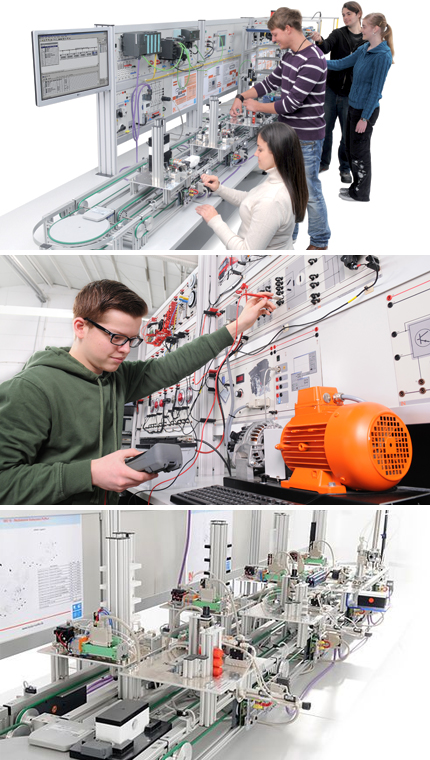The
"Industry 4.0" initiative describes the implementation of so-called smart factories, which includes intelligent interaction between human beings and machinery. It involves the integration of intelligent work pieces, manufacturing equipment and flexible value-adding procedures into the production process. This seeks to achieve distributed production with a maximum of flexibility at a minimum of cost.
In a smart factory, systems keep people informed about production and status and provide assistance with the control and monitoring of the process. A smart factory is characterised by the communication between products and the machinery which makes them. The product retains information about its own manufacture in machine-readable form, on an RFID chip for example. With the help of this data, the passage of the product through the manufacturing system and the individual steps in its manufacture can be controlled.
Lucas-Nülle, a world leader in technical education solutions, has sets aimed at various levels, from beginner through to advanced studies, including:
- Smart factory foundation set: This encompasses all the topics needed to understand and implement a smart factory.
- Bus systems play a key role in the communication aspect. Aspects such as cyber-physical systems (CPS) or flexibility of plant only become possible when bus systems are employed.
- RFID can be seen as being at the core of production in a smart factory. An RFID chip is used to process the requisite data so that the items being worked upon have their own memory. They ‘know’ when the process begins how they are supposed to look at the end of it and they themselves take control of the processing stations to ensure that they are processed in the right way.
- The knowledge learned so far is put to use in a small, initial smart factory application. A compact conveyor station is used to cover the topic.
- Smart factory basic set: The basic set encompasses a complete production line on which production of a work piece is controlled with the help of RFID tags. A three-part work piece can be assembled in eight different combinations.
- Smart factory extension sets: Should a manufacturing plant be controlled and monitored solely from its own control centre or can that also be handled remotely by means of a smartphone, tablet or laptop? Should production be treated in a more intelligent way? Capabilities, such as variable production sequences, statistical monitoring and fault analysis, can be developed on expanded systems.
The Industry 4.0 training systems foster the critical skill sets for the engineers and technical operators of tomorrow. Quality equipment supported by accompanying ILA courses (Interactive Lab Assistant courses) provides a powerful learning and experiment platform.
See more of our Hydraulics and Automation range by clicking here.
To learn more about automation training systems such as these and beyond, please contact Training Systems Australia on +613 9557 7993.
